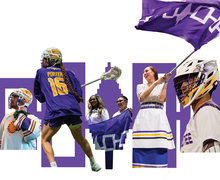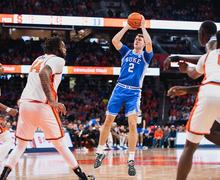Former NASA administrator Fred Gregory presents SU Astronaut Scholarships
Leanne Rivera | Staff Photographer
Fred Gregory, a board member of the Astronaut Scholarship Foundation, shares his experiences as an astronaut during a Tuesday afternoon event hosted at the National Veterans Resource Center. Gregory praised Syracuse University's newest Astronaut Scholars in the wake of more STEM investments by the university.
Get the latest Syracuse news delivered right to your inbox.
Subscribe to our newsletter here.
Syracuse University hosted Fred Gregory, a retired astronaut and Air Force colonel and a former NASA deputy administrator, to recognize SU’s Astronaut Scholars at the National Veteran Resource Center on Tuesday afternoon.
Gregory serves as a board member of the Astronaut Scholarship Foundation, which provides over 60 scholarships, mentorships and professional development programs to students studying in STEM fields, including the Astronaut Scholarship. During Tuesday’s event, Gregory spoke of his career experience and his hopes for Alex Metcalf and Matt Cufari, this year’s scholarship recipients.
“I’m extremely honored to be a recipient of this scholarship and a member of the astronaut scholar community,” Cufari said. “This scholarship represents the culmination of several years of academic and professional effort.”
The Astronaut Scholarship’s mission — to further students’ development of skills in engineering and technology — is in line with SU’s recent expansion of STEM programs following Micron’s decision to invest up to $1 billion to build a semiconductor manufacturing plant in Clay, New York.
SU has already announced partnerships with Micron for education and professional training, as well as veteran student worker recruitment.
The initial draft of SU’s Academic Strategic Plan released last week outlined plans to expand the university’s STEM educational and research capacities. SU also joined the National Science Foundation’s Innovation Corps northeast hub in September along with four other universities. The hub provides $3 million to each school over five years for STEM entrepreneurship training.
The original Mercury Seven astronauts – the astronauts on the first-ever human spaceflight program in 1959 – founded ASF in 1984, and awarded its first round of scholarships in 1986. The Astronaut Scholarship has awarded more than $7 million worth of scholarships to over 100 undergraduates since its formation. Gregory emphasized that the scholarship provides students with more than just money.
“ASF maintains a lifelong relationship with each Astronaut Scholar,” Gregory said. “(It) provides them with mentor opportunities for personal and professional development and chances to connect with astronauts, executives and industry leaders,”
In their speeches, both Metcalf and Cufari expressed their confidence and excitement in being chosen for the scholarship. Metcalf was chosen as an Astronaut Scholar for the 2021-2022 school year, and Cufari was chosen for the 2022-2023 school year.
“The ASF Scholarship … prioritizes family, community and camaraderie in every sense,” Metcalf said. “Even if the scholarship did not come with national recognition, and, of course, the money, it would be an honor to receive it nonetheless for that alone.”
The scholarship has allowed Metcalf and Cufari to connect with other Astronaut Scholars and current astronauts while pursuing STEM research. Cufari said he’s been able to attend conferences and apply to PhD programs with the funding.
One of SU’s collaborative programs with Micron, a Future-Ready Workforce Innovation Consortium, will be housed in the College of Professional Studies. The program is set to focus on providing the professional and skills-based training students need to enter the workforce, according to Chancellor Kent Syverud’s announcement of the program in October.
SU’s Institute of Veterans and Military Families, which hosted the event, is participating in a joint initiative with Micron to help students develop professional STEM skills which align with the company’s incoming workforce demands. The initiative’s goal is to achieve Micron’s goal to hire at least 1,500 veterans over the next two decades, according to a news release announcing the partnership.
Through the Astronaut Scholarship, Cufari said he’s had the opportunity to develop his education and experience with a focus on career.
“The Astronaut Scholarship Foundation has been extremely supportive of my professional goals,” Cufari said. “They’ve led me to mentorship opportunities with the leaders in the Space Systems industry and provided my cohort several career development opportunities.”
Gregory pointed to his career in space exploration as formative of his worldview. After completing three missions to space, Gregory served as deputy administrator for NASA until 2005 before being inducted into the U.S. Astronaut Hall of Fame in 2004.
“If you were in an aircraft of some type and you were going to fly over this Milky Way, it would take you 100,000 light years to cross it. Your sense of where it is that you are and the importance of it just totally disappears,” Gregory said. “(You realize) that you are not significant, that this is the most amazing thing that can happen.”
Gregory said that as the next generation of potential astronauts, Metcalf and Cufari represent the possibilities of future space exploration.
“We’re looking at this journey we’re on where there’s no destination. There’s no end in sight, but a lot of adventures,” Greorgory said. “The question is, what are you guys going to do to enable us to learn as much as we can and be part of this journey?”
Published on March 1, 2023 at 12:17 am
Contact Sydney: srrothst@syr.edu





